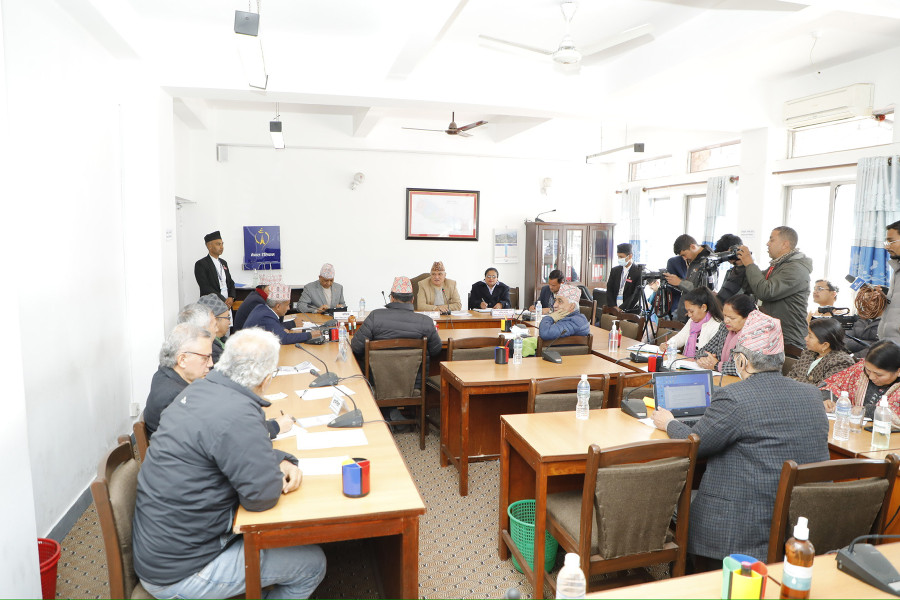National
House panel decision on nursing colleges lands in controversy
The committee directive, which allows nursing colleges without their own building to resume instruction, has divided committee members.
Post Report
A House committee’s directive to the government to allow nursing colleges without their own hospitals to resume their academic programmes has landed in controversy following objections from some lawmakers.
The Education, Health and Information Technology Committee of the House of Representatives on Wednesday directed the Medical Commission and the Council for Technical Education and Vocational Training (CTEVT) through the Ministry of Education, Science and Technology to allow the operation of the nursing colleges that have remained closed for two years.
“It is impractical to shut the operation of the nursing colleges while the dental programme [in the colleges that don’t have 100-bed hospitals] continues,” reads the directive. As many as 64 nursing colleges will benefit from the decision.
The Medical Education Commission shuttered such colleges two years ago citing clause 11 of the Medical Education Act, which states that each college teaching nursing and dental courses must establish a 100-bed hospital. In 2018, the commission had given nursing colleges two years to build their own hospitals. But the colleges couldn't do so. As a result, the commission stopped them from admitting new students.
United under the umbrella of the Medical Education Concern and Struggle Committee, medical education providers have long been protesting against the commission’s move. They have accused the commission of wrongly interpreting the law to force them to halt their services. They claim that the Act authorises the commission to oversee only university education, not the institutions affiliated with the CTEVT.
However, the commission sticks to its position that it is authorised to supervise all institutions providing medical education, no matter what board they are affiliated to. The closure of the nursing colleges has also deepened the jurisdiction row between the commission and the CTEVT. As a result, the House committee in September intervened in the matter.
It had also formed a sub-committee to study the matter and recommend the steps necessary to resolve it.
Badri Pandey, a Nepali Congress member on the House committee who was also in the sub-panel, said the directive was issued after a thorough consultation among all members. However, lawmakers from the Rastriya Swatantra Party say there was no agreement to allow the closed nursing colleges to operate.
"We discussed the issue in the committee but no decision to this effect was made," Sumana Shrestha, a Rastriya Swatantra Party lawmaker, told the Post. "We had clearly said the House committee cannot issue any directive that contradicts the Act. This decision is illegal and unacceptable."
Pandey, however, claimed that there was no objection from the Rastriya Swatantra Party lawmakers to the decision. “Can they show their note of dissent if they had objected to it?” he said, adding that they would discuss the matter in the next meeting.
A meeting of the House committee has been called for Sunday.
Nursing college operators accuse the commission of overstepping its jurisdiction and forcing the colleges without their own hospitals to halt services. They say as many as 228 colleges—including 136 offering pre-diploma health education, 73 providing diploma-level staff nurse courses and 18 colleges teaching bachelor in nursing and nursing science courses—have ceased their operations due to the commission's decision. They claim this puts their investments worth Rs15 billion at risk.
As per a report of the Forum for Health and Technical Science, an umbrella body of the colleges providing nursing and medical education, around 4,000 students would have enrolled for nursing until 2021, but now only 1,200 seats are available. Though over 10,000 students sit for entrance exams, most are unable to study the courses of their choice in the country.
Until the commission’s intervention, the institutions were partnering with hospitals, mainly government-run ones, to engage students in practice. The House committee has kept the door open for such partnership.
The education providers said they can't set up their own hospitals because doing so will cost them at least a billion rupees and operation costs are high. They argue that drawing a sufficient flow of patients will be a challenge even if they establish their own hospitals.




 10.12°C Kathmandu
10.12°C Kathmandu














